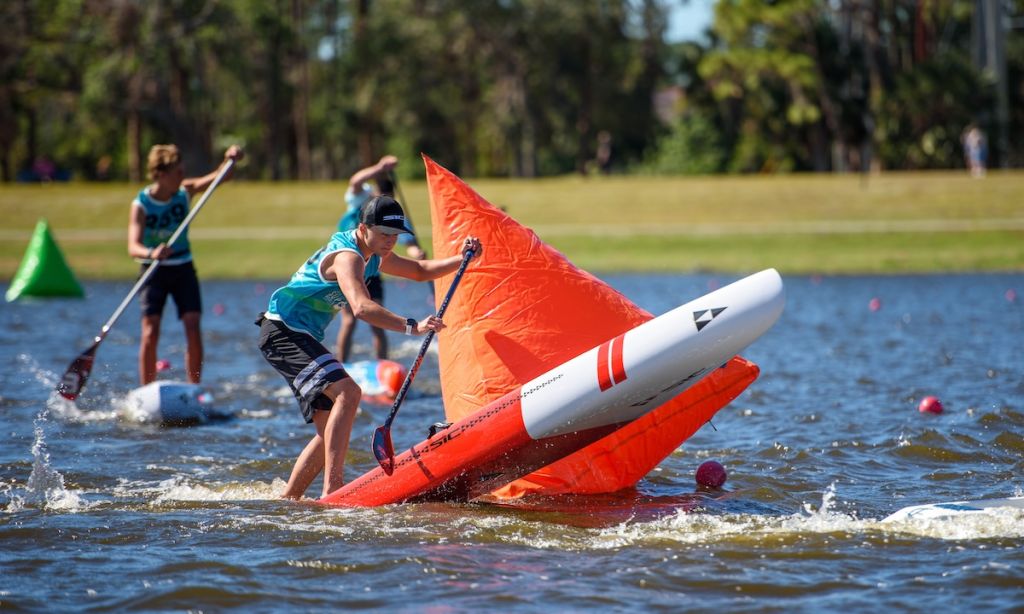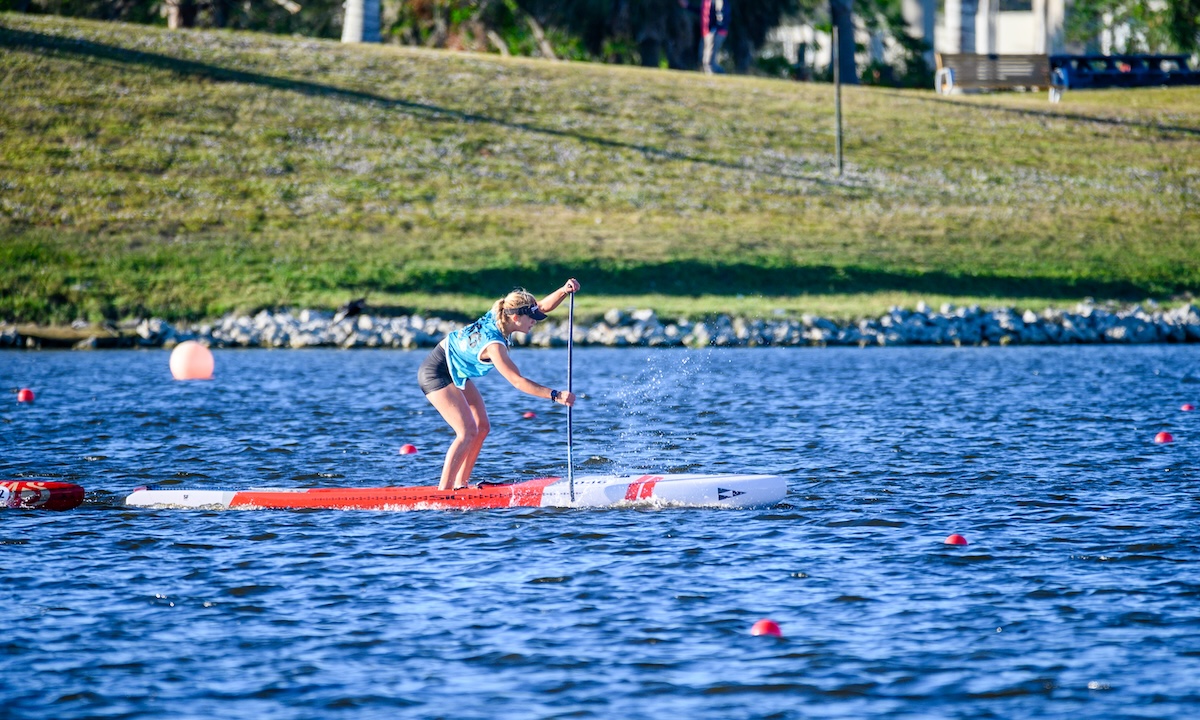The ICF Postpones Its One-Design SUP Board Ruling
- Written by Staff
- Published in News
- Comments::DISQUS_COMMENTS
 SIC Maui junior athlete Elliot Bry at the 2024 ICF Championships in Sarasota. | Photo courtesy: SIC Maui / Charles Dasher
SIC Maui junior athlete Elliot Bry at the 2024 ICF Championships in Sarasota. | Photo courtesy: SIC Maui / Charles Dasher
In a significant development for the junior standup paddling community, the International Canoe Federation (ICF) has decided to postpone the introduction of the one-design board that was originally set to be required for young athletes starting at this year’s 2025 ICF SUP World Championships. According to the ICF’s latest update, this board will not be used at the 2025 World Championships in Abu Dhabi, giving participants and their support networks more time to plan, train, and adjust.
This move follows earlier announcements in which the ICF stated its intentions to enforce a one-size-fits-all approach for junior paddlers, aimed primarily at making paddle sports more accessible by alleviating equipment costs and logistical challenges. In our previous article, we noted that while many welcomed the idea of lowering financial barriers, seasoned junior paddlers—such as Soryn Preston, who withdrew from future events—expressed concerns about losing personalized equipment advantages and sponsor relationships.
A Balance Between Accessibility and Preparedness
By pushing back the introduction of the standardized 14-foot board, the ICF is demonstrating both prudence and responsiveness. Among the main justifications for the delay is ensuring that juniors have sufficient preparation time to transition to the new format. Production and procurement timelines can be lengthy, and rushing into the new system risks uneven distribution and confusion among athletes, families, and sponsors.
Postponing the mandate recognizes that any major equipment overhaul requires a thoughtful roadmap. Training routines, sponsor commitments, and technical skills—often years in the making—cannot be easily recalibrated in a single off-season. Moreover, granting extra time reduces financial strain on families, who may need to factor in the cost of acquiring (or renting) the new board and traveling with it. Although the stated goal of the one-design rule was to simplify equipment logistics, such a shift also has hidden expenses and complexities.
 SIC Maui athlete Soryn Preston at the 2024 ICF Championships in Sarasota. | Photo courtesy: SIC Maui / Charles Dasher
SIC Maui athlete Soryn Preston at the 2024 ICF Championships in Sarasota. | Photo courtesy: SIC Maui / Charles Dasher
The Extended Timeline: Relief for Some, Continued Uncertainty for Others
For many participants, postponement is welcome news: it means fewer immediate disruptions to planned training cycles, financial planning, and brand partnerships. While some were initially concerned about being compelled to purchase or ship a board they had not chosen themselves, they now have at least one more major championship—Abu Dhabi 2025—to stick with their trusted setups.
However, the delay does not come without questions. Athletes and coaches who had already begun to adapt to the possibility of a single standardized board may now find themselves in limbo. The future timeline for the one-design rule remains unclear, leaving open the possibility that the requirement could reemerge as soon as 2026—or later—for major championships. This uncertainty affects decision-making for juniors and their families, especially those who like to plan equipment and sponsorship deals years ahead.
The ICF’s Tightrope: Innovation, Fairness, and Growth
One of the foundational debates around the one-design board has centered on whether standardizing equipment might encourage innovation or stifle it. By postponing the launch, the ICF has effectively chosen to keep alive the “personal board culture” in junior SUP racing, at least for the next few years. In that window, board manufacturers and sponsors can still focus on refining specialized designs, while junior athletes continue to perfect their technique on gear they’ve trained with extensively.
At the same time, the postponement indicates the ICF’s awareness that rolling out a standardized program prematurely could alienate key stakeholders. From the athletes’ perspective, being forced to use a new board in a world championship setting—without adequate lead-in time—would create additional stress and potential performance disparities, undermining the level playing field the rule was meant to achieve.
Looking Ahead
With the decision to exclude the one-design board from Abu Dhabi 2025, the ICF now has a chance to develop a robust “introduction strategy” that addresses the lessons learned from the earlier backlash. This could include:
- Transparent Timelines - Laying out a clear plan for when the one-design board rule might actually take effect, allowing athletes, coaches, and sponsors to prepare in an orderly fashion.
- Equipment Testing & Collaboration - Encouraging open dialogue with manufacturers, sponsors, and paddlers to ensure that any standardized board meets performance, safety, and durability criteria.
- Educational Resources & Support - Providing clinics, workshops, and funding avenues that help young paddlers become familiar with the standardized board—especially those lacking the resources for early trials.
- Feedback Mechanisms - Building a feedback loop that encourages athletes, parents, and coaches to weigh in on design tweaks or logistical improvements before a final rule is enforced at a major event.
If executed thoughtfully, the one-design concept can still broaden access to SUP racing by reducing equipment inequities and expensive shipping obligations. The key lies in adopting a process that is transparent, well-communicated, and flexible enough to accommodate genuine concerns.
Conclusion
The ICF’s recent announcement to delay the introduction of a one-design board for juniors underscores the complexity of implementing a major equipment standard in a sport where individual preference, innovation, and sponsorship play vital roles. While some may see this postponement as a setback to an initiative designed to foster inclusivity, others will embrace the extra runway to train with their existing setups, align with sponsors, and adapt at a more measured pace.
Whether the postponement proves to be a welcome reprieve or merely a delayed inevitability remains to be seen. For now, the junior SUP community can look ahead to the 2025 World Championships in Abu Dhabi without the pressure of an immediate board change, all while keeping one eye on how the ICF eventually decides to navigate this pivotal transformation in youth standup paddling. As new details emerge—on design, availability, and exact rollout timelines—we will continue to monitor the conversation and update on how these developments might reshape the future of junior SUP racing.

Staff
Submit your news, events, and all SUP info, so we can keep promoting and driving the great lifestyle of stand up paddling, building its community, and introducing people to healthier living.
Website: supconnect.com Email This email address is being protected from spambots. You need JavaScript enabled to view it.




